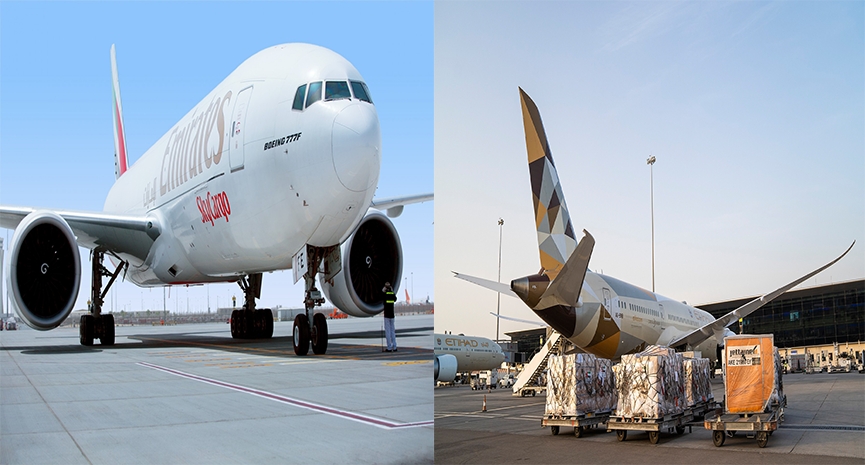Emirates SkyCargo, Etihad Cargo to support Australian exports
Etihad Cargo and Emirates SkyCargo have both announced partnerships with the Australian government to support its International Freight Assistance Mechanism (IFAM) programme.

April 25, 2020: After Qatar Airways Cargo, Etihad Cargo and Emirates SkyCargo have both announced partnerships with the Australian government to support its International Freight Assistance Mechanism (IFAM) programme. The initiative has been established by the Australian government to accelerate delivery of agricultural and fisheries exports into key overseas markets, with over 560 Australian businesses already registering their interest in utilising the IFAM.
Under the agreement with the Australian Trade and Investment Commission (Austrade), Etihad Cargo will provide dedicated cargo services between Abu Dhabi and Australia, leveraging bellyhold capacity of its fleet of Etihad Airways passenger aircraft to deliver essential supplies into the Australian market, and facilitate bi-directional trade to further ensure continuity of fresh imports to the UAE from Australia including meat, fish and seafood, fruits, and vegetables.
Abdulla Mohamed Shadid, MD cargo and logistics at Etihad Aviation Group said, “In this time of crisis, the facilitation of international trade and delivery of essential supplies is more important than ever. Australia has been a long time and vital trading partner for the UAE and we are pleased to be able to continue to provide this lifeline connecting our countries and enabling the movement of goods that is helping to save people’s lives, supporting Australia’s produce exporters and continuing to support the UAE’s food security programme.”
The addition of weekly services to Australia expands on Etihad Cargo’s network of 22 cargo-only passenger freighters, plus an additional 10 used for charters, with regular services already in place between Abu Dhabi and Amsterdam, Brussels, Beijing, Bangkok, Bangalore, Chennai, Delhi, Frankfurt, Istanbul, Jakarta, Kochi, Karachi, Kuala Lumpur, London, Manila, Mumbai, Oslo, Seoul, Singapore, Tokyo, and Zurich.
“Emirates SkyCargo is an important facilitator of international trade and we are proud to be working with the Australian government to help provide a vital channel for Australian exports of fresh produce and seafood to reach worldwide markets in these critical times. We are currently serving Sydney with four weekly flights on our Boeing 777 freighter aircraft and Melbourne with five weekly flights on our Boeing 777-300ER passenger aircraft. We are committed to supporting Australian farms and businesses and to helping transport vital food supplies to key global markets,” said Nabil Sultan, Emirates divisional senior vice president, cargo.
Emirates SkyCargo is currently operating scheduled cargo flights on its Boeing 777-F and Boeing 777-300ER passenger aircraft to close to 60 global destinations. The air cargo carrier has helped transport vital medical supplies to different parts of the world including to Australia on both its scheduled flights as well as on special charter flights.
Federal trade minister Simon Birmingham said this new network would be crucial to coordinating international freight out of Australia until commercial passenger flights were restored.
“Around 90 per cent of our air freight, usually goes out in the bellies of passenger aircraft. With very few international passenger flights leaving Australia at present, our exporters are facing major hurdles,” Birmingham said. “Through the better coordination of freight out of Australia, we can restore key freight routes and establish more frequent flights to our key markets so our agricultural and fisheries exporters can deliver their products to customers on time. We’ve moved quickly to establish this network and are now getting on with the job of supporting our exporters to get their products flowing again. With a network of some of the world’s largest airlines and most reputable freight forwarders in place, we’re injecting more reliability into the system that will also help our smaller exporters to aggregate their freight into volumes so they don’t miss out on export opportunities.”
In addition to regularly scheduled cargo services, these activities ensure the delivery of fresh food, pharmaceuticals and medical supplies as part of the global response to the Covid-19 pandemic.


